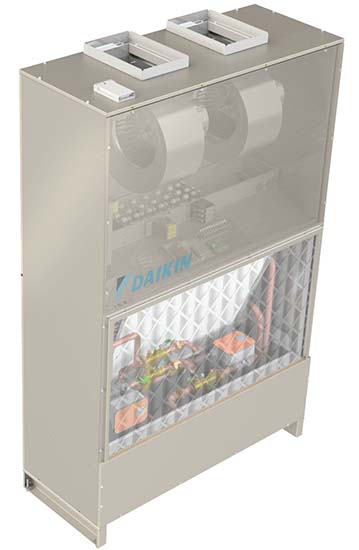

The Gold award in the HVAC Commercial Equipment category goes to the PreciseLine air handler by Daikin Applied, which offers the modularity and performance of a larger air handler, but in a smaller package and at a fractional price point.
“While air handlers have evolved over the last 20 years, most of the innovation has focused on the applied and custom markets, leaving standard, budget-friendly products at a standstill,” said Chris Stocker, senior product manager at Daikin Applied. “PreciseLine is one of the first compact air handlers with advancements such as thermally broken foam panels and EC motors — all at an extremely competitive price point.”
Dustin Riewe, project manager at Harkins Co. in Austin, Texas, appreciates that the units are available with EC motors, as this alleviates the need for external variable-frequency drives (VFDs). Another benefit is the compact size of the units.
“Our project needed an efficient and relatively high-capacity unit but only allowed a small footprint for availability. PreciseLine air handlers met all those requirements,” he said. “Another benefit is the submittal process through our vendor and Daikin Applied engineering. The product data sheets were clear, concise, and met all project constraints the first time through. This mitigated wasted time during review and allowed for the units to be delivered according to the construction schedule. This all translates into profitability.”
PreciseLine is available in both horizontal and vertical configurations and incorporates direct-drive supply fans to condition air at precise levels up to 5,000 cfm. These compact air handlers can be designed for multiple functions such as cooling only, cooling and heating, 100% air return, or mixed air uses.
“PreciseLine was designed to take up as little floor space as possible,” said Stocker. “The compact footprint allows contractors and engineers to use the unit for applications that would traditionally create challenges for service personnel. Additionally, access doors and panels are strategically located on the unit for maximum efficiency. For example, the BCA model fits in closets and is designed with front or top filter-replacement access and a front service panel, which allows for easy access to service the unit.”
All major serviceable components of PreciseLine are installed on tracks that allow for single-side servicing and easy access to attend to issues or replace components, from addressing a leak in a coil to changing a fan motor. Those items are either connected via quick-connect plugs or union joints at the factory to prevent excessive in-the-field rewiring or brazing.
PreciseLine accommodates up to a MERV 13 filter, which can remove most common airborne contaminants. The units also have availability of high-capacity, eight-row primary cooling coils that can handle the extremes of large ventilation loads and provide additional fresh air to conditioned spaces without compromising occupant comfort.
Daikin Applied spent two years designing the PreciseLine air handler by integrating innovations from across its broader portfolio to optimize heat transfer and air moving, energy efficiency, and serviceability. The company spent hundreds of hours traveling throughout North America to connect with installing contractors, building owners, and sales representatives to collect their input on the current state of the air handler market and to understand their common needs. The new state-of-the-art environmental test chambers at its U.S. headquarters in Minnesota were used to test reliability and efficiency.

The Silver award in the HVAC Commercial Equipment category goes to the 85 Control Board for fan coils by International Environmental Corp. (IEC). The 85 Control Board offers simplified install and service with its plug-in connections and QR code for quick wiring diagram reference and aftermarket parts. It also offers LED diagnostics and built-in design flexibility for added features such as staged cooling or BAS signal input.
Available as of January 2021, the 85 Control Board will come standard in various horizontal and vertical IEC fan coil and cabinet heater product families. It has an input for seamless connection to existing BAS and also offers the flexibility for less expensive BAS through the use of Wi-Fi-enabled remote controlled thermostats
In the 18 months it took to design the 85 Control Board, IEC hosted a series of contractor, engineer, and sales interviews to gather data on the current and future market demands for fan coil controls solutions. Additionally, the company hosted customer/sales representative workshops to generate feedback for the control features to include with the base 85 Control Board and future modular solutions.
With implementation of the 85 Control Board Series, IEC is paving the road for future modular solutions, including boards and modules for Wi-Fi communication, additional sensors, and more.

The Bronze award in the HVAC Commercial Equipment category goes to the Premier commercial rooftop unit by Johnson Controls. Premier 25- to 80-ton rooftop units deliver enhanced performance and efficiency with greater flexibility and ease of installation and service to reduce operational and maintenance costs. They also ensure IAQ is maximized through optional features such as ultraviolet lights, humidifiers, and final filters.
Premier units can provide up to 50% greater efficiency at part-load than is required, depending on the standard. Standard double-wall foam panels offer improved thermal efficiency, while modulating options such as compressors, energy recovery wheels, and gas and electric heat further improve efficiency, providing quality comfort. These rooftop units are engineered for simplified serviceability to lower the lifecycle costs of the unit.
Over four years of research, development, and testing were completed in preparation for the Premier units. This included voice-of-customer, focus groups, finite element analysis, lab testing, and user-interface direct feedback studies. Product line expansion was a result of working to increase the capabilities and offering into larger tonnages, which is required to meet the Department of Energy’s (DOE’s) 2023 requirements.








